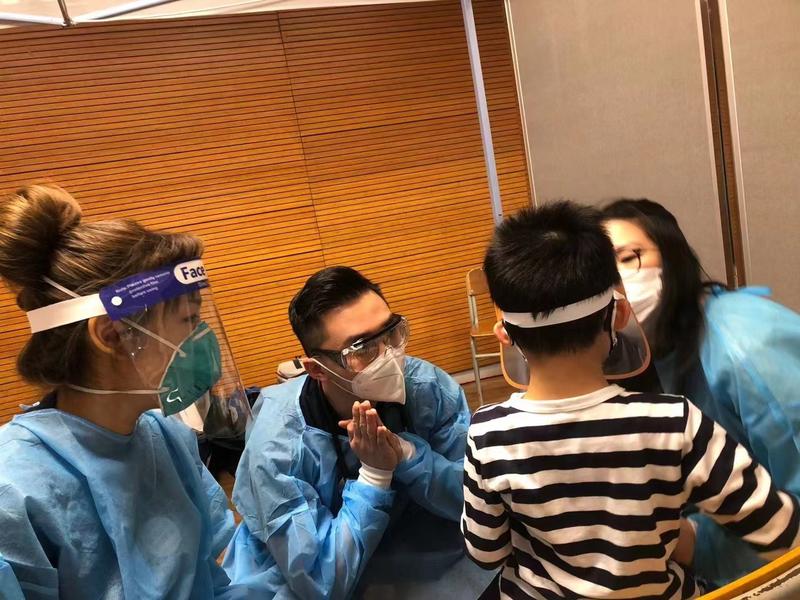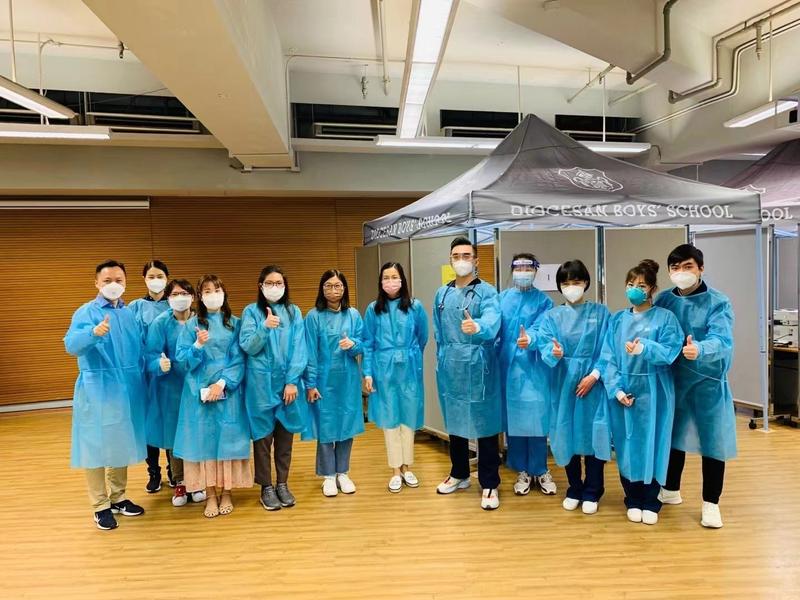 A major part of Fu Di’s job is vaccinating children. He has figured out a way to calm the kids and make the inoculation process a happy event. (PHOTO PROVIDED TO CHINA DAILY)
A major part of Fu Di’s job is vaccinating children. He has figured out a way to calm the kids and make the inoculation process a happy event. (PHOTO PROVIDED TO CHINA DAILY)
He has armed almost 3,000 people, ranging in ages from 3 to 96, with immunity against the coronavirus. He has turned his professional know-how into a shot in the arm for the public in the drawn-out battle against the COVID-19.

Fu Di, a doctor and chief medical executive of Gardenia Medical, says he will do whatever he can to convince unvaccinated elderly people to get their shots. “The best shortcut in the world is to not take shortcuts,” he has decided.
The explosive surge in new infections every day has brought Hong Kong to its knees, depleting the city’s medical resources and causing nervousness everywhere in the city. But it’s the petrifying death toll that really leaves Hong Kong shaking in its boots.
A close look at the ages and histories of those who have died from the virus reveals that an estimated 90 percent of them were unvaccinated and the majority of them were people over the age of 60. The consensus among medical experts is that the low vaccination rate among the city’s elderly is a primary contributor to Hong Kong’s death rate, now the highest in the world.
To keep the death rate in check and reduce the number of severe cases, vaccinations among the youngest and oldest populations are the go-to answer, reckons Fu. Some elderly people vehemently reject suggestions they should be inoculated, largely because “they buy the rumors” about the vaccine’s side effects, which have been peddled virally since last year when the vaccines were rolled out, reasons Fu.
We’ve seen a substantial increase in the percentage of the elderly and children coming to our clinic for vaccination, from merely 5 to 10 percent last year to 30 to 40 percent currently, which is very heartening.
Fu Di, Chief Medical Executive, Gardenia Medical
Social media is swarmed with naysayers who exaggerate the harmful effects of vaccination, create a sensation over occasional deaths and appear oblivious to the benefits; all of which fuels misconceptions and phobias among the public, observes Fu.
“Some of my patients balk at the prospect of facial paralysis, brain atrophy, death and even altering DNA after the vaccination,” says Fu. To convince the public, especially the elderly, to take their jabs, Fu decided to “dispel the misperception about the vaccine through education”. He has held more than 35 sharing sessions since last March when the vaccines were made available, most of which are free and were self-funded.
Last year his speech focused on “busting the myths about vaccination” and “telling the truth of its efficacy”, while the topic this year encapsulates infection prevention tips and guidance for caregivers of COVID-19 patients.
Fu even held one-on-one, face-to-face consultation sessions with unvaccinated elderly people, going to great lengths to address concerns raised that hold the elderly back from getting the jabs, on a case-by-case basis. “Many of them have medical histories. For example, some live with diabetes and are on long-term medications,” he says. Whether the vaccine will worsen their condition, trigger complications and affect their medication routine are legitimate concerns, “which can only be ironed out by professionals like us.” Once they find answers to their hang-ups and anxieties, getting their jabs just comes naturally, Fu believes.
“We’ve seen a substantial increase in the percentage of the elderly and children coming to our clinic for vaccination, from merely 5 to 10 percent last year to 30 to 40 percent currently, which is very heartening,” Fu says. As vaccine penetration improves in the city, driven by positive promotion within society and salient efficacies borne out by real cases and bodies of research, overall vaccine acceptance increases, he says.
 Fu Di has been selected as one of the 2020 Ten Outstanding New Hong Kong Young Persons.
Fu Di has been selected as one of the 2020 Ten Outstanding New Hong Kong Young Persons.
While many elderly people come round to accepting the benefits of getting vaccinated after attending Fu’s presentations or consultations, there’re some who stick to their guns. “Their bias against the vaccine has been so engrained in their mind that they can hardly budge,” says Fu.
Despite his painstaking attempts to persuade such individuals to think otherwise, Fu’s patience never wears thin, because he’s learnt a mantra which he has often repeated to himself since he entered the medical field. “To cure sometimes, to relieve often, to comfort always,” Fu reels off.
Doctors and nurses are predisposed to acquire an empathic, patient and compassionate personality, as their jobs involve tending to the most vulnerable and needy; or conversely, they already possess those traits naturally, which is why they have chosen a people-centric occupation. For Fu, both apply.
“I consider myself a caring person with a sense of social responsibility, which is a prerequisite to become a medical worker,” he says. “But my cool temper and composure in tough situations are acquired traits. I’m now able to remain unfazed and resilient when emergencies arise.”
 Fu is volunteering to vaccinate children in Yau Tsim Mong district as well as students and teachers of Diocesan School in March.
Fu is volunteering to vaccinate children in Yau Tsim Mong district as well as students and teachers of Diocesan School in March.
Fu is both a doctor and the boss at the helm of his clinic, which means there is a greater onus on him — he has to make sure his employees are not only safe and sound, but that they also get their pay on time every month, a feat which is riddled with uncertainty during the pandemic-induced economic downturn. While navigating his staff through the rocky patches, Fu says there have been times when he has been “at rock bottom”.
“At crunch time, some staff were infected or their family members were, so we had only five staff (out of 10) working in the clinic. Morale was bleak,” Fu recalls.
Having heartfelt conversations with his staff, flexibly adjusting absentees’ work modules, boosting their morale while inspiring them to work on the frontline — such things have become part of Fu’s routine.
Keeping a self-sustained clinic going strong is no easy feat, particularly during such trying times for the city. “If the government provides more support to private clinics, I’m sure we’ll be more capable and empowered to contribute more in return,” Fu says.


